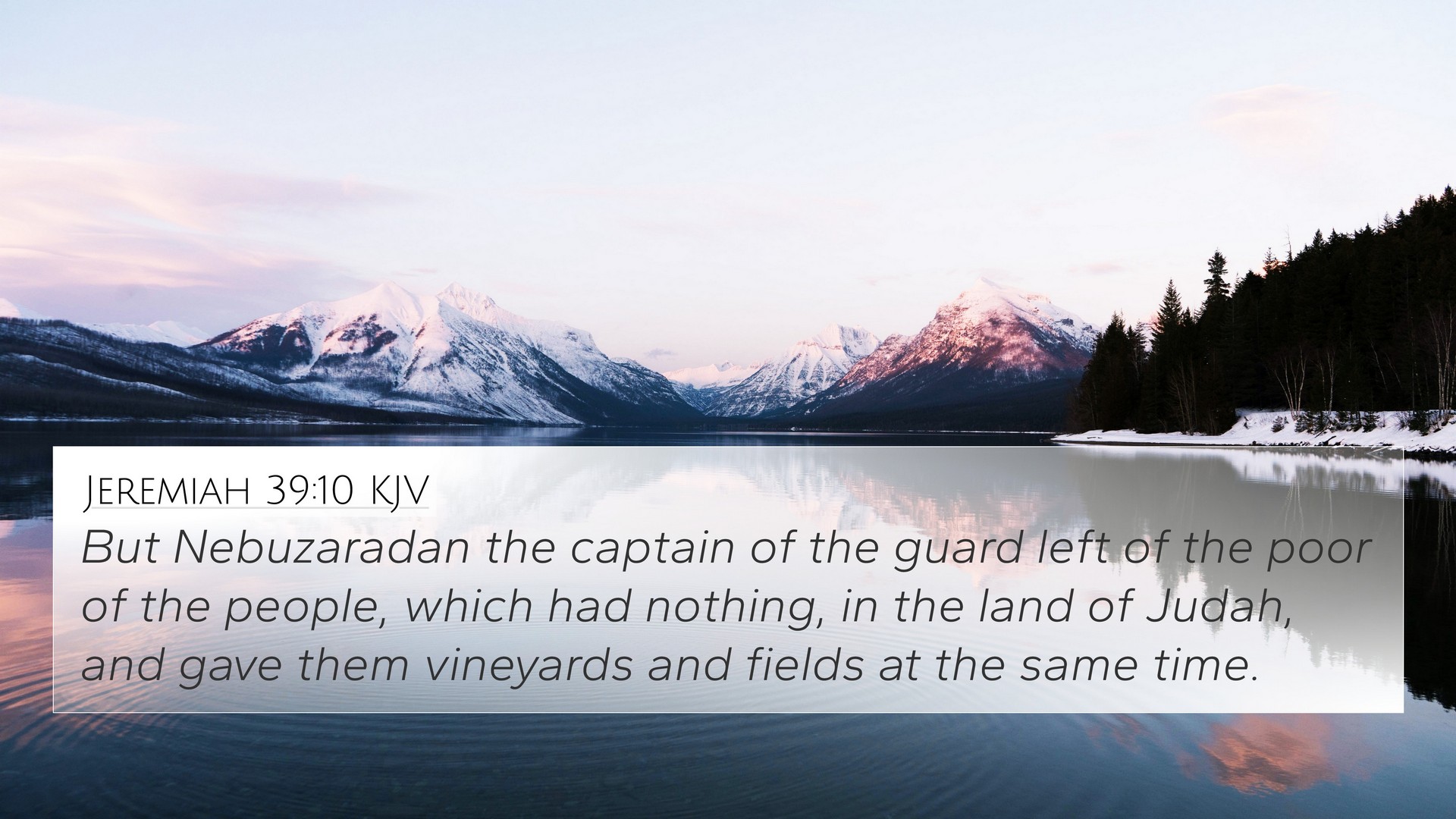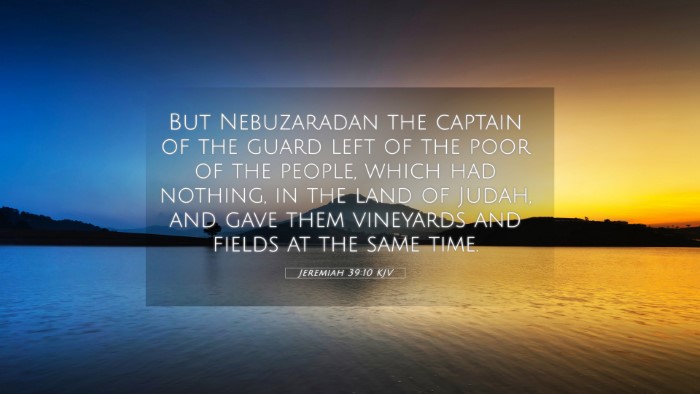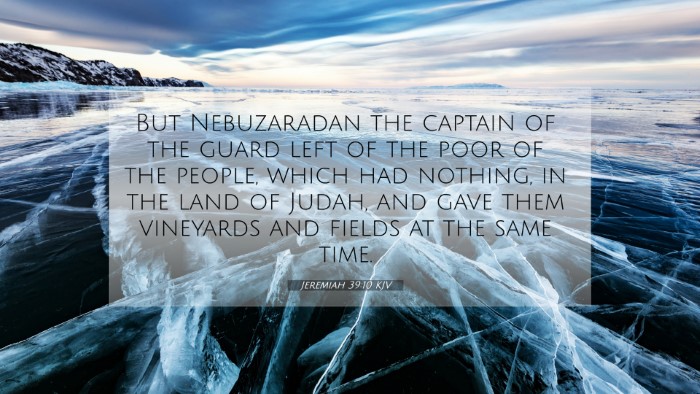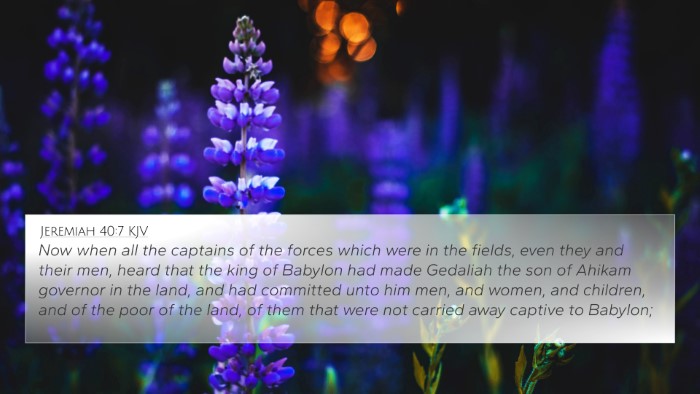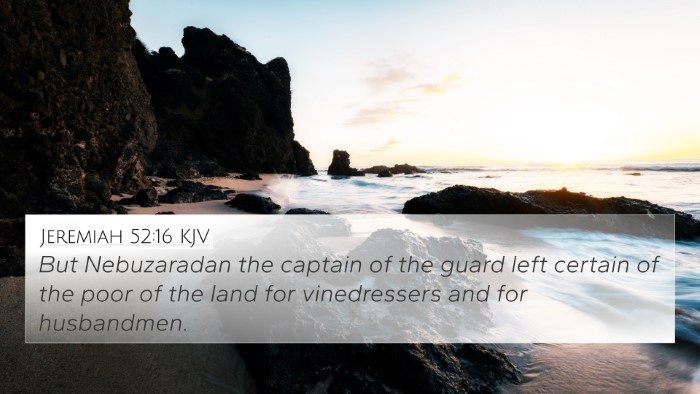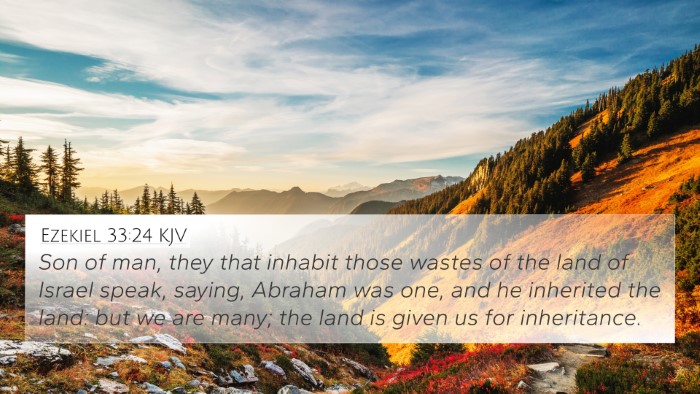Understanding Jeremiah 39:10
Jeremiah 39:10 states, "But Nebuzaradan the captain of the guard left of the poor of the people, which had nothing, in the land of Judah, and gave them vineyards and fields at the same time." This verse is a poignant moment that showcases God's provision even in the aftermath of devastation.
Contextual Background
In order to fully understand the implications of this verse, it is important to consider its context in the Book of Jeremiah. This prophet, known for his warnings of impending judgment, writes during a tumultuous period in Israel's history. The invasion by Babylon and subsequent destruction of Jerusalem mark a significant event leading to the exile of many Israelites.
Insights from Public Domain Commentaries
-
Matthew Henry: Henry emphasizes that God's mercy can be found even among the ruins and devastation. He points out that while the elite and those of influence were taken away, God had a heart for the poor and destitute. This moment reflects a divine kindness, suggesting hope for restoration.
-
Albert Barnes: Barnes notes the significance of Nebuzaradan’s actions. By allowing the poor to remain in their land and providing for them, there is a sign that God had not abandoned His people completely. It indicates that amidst calamity, God still orchestrates care and provision.
-
Adam Clarke: Clarke discusses the implications of the 'poor of the people' being left behind. He suggests that it signifies God’s continuing presence and care for those who are humble and dependent on Him, which ties into broader biblical themes of God favoring the lowly.
Thematic Connections and Cross-References
The themes in Jeremiah 39:10 can be connected to various other scriptures that highlight God's mercy, provision, and care for the marginalized. Below are cross-references that relate to this verse:
- Isaiah 41:17: "The poor and needy seek water, and there is none, and their tongue faileth for thirst: I the Lord will hear them, I the God of Israel will not forsake them." - A demonstration of God's unwavering support for the needy.
- Psalms 9:18: "For the needy shall not always be forgotten: the expectation of the poor shall not perish forever." - A promise of God’s remembrance of the poor and downtrodden.
- Matthew 5:3: "Blessed are the poor in spirit: for theirs is the kingdom of heaven." - Reflects God’s favor towards those who are humble and reliant on Him.
- Luke 4:18: "The Spirit of the Lord is upon me, because he hath anointed me to preach the gospel to the poor; he hath sent me to heal the brokenhearted..." - Highlights Jesus' mission towards the marginalized.
- James 2:5: "Hearken, my beloved brethren, Hath not God chosen the poor of this world rich in faith, and heirs of the kingdom which he hath promised to them that love him?" - Reinforces the idea that God has a special place in His heart for the poor.
- Proverbs 19:17: "He that hath pity upon the poor lendeth unto the Lord; and that which he hath given will he pay him again." - A reminder that acts of kindness towards the poor are noticed by God.
- Matthew 25:40: "And the King shall answer and say unto them, Verily I say unto you, Inasmuch as ye have done it unto one of the least of these my brethren, ye have done it unto me." - Anything done for the least is done for Christ Himself.
Conclusion
Jeremiah 39:10 serves as a reminder that even in hardship, God’s provision is evident, particularly for those whom society often overlooks. The insights drawn from this verse, along with the cross-references provided, form a network of themes that reinforce God’s faithfulness and love towards the marginalized.
Using Cross-References Effectively
For those studying the Bible, understanding how to use cross-references can illuminate connections between various scriptures, enriching one's study and understanding of God's Word. Tools for Bible cross-referencing such as a Bible concordance or a cross-reference Bible study guide can help uncover these hidden links. Here are some methods:
-
Exploring Thematic Connections: Identify themes within a passage and explore how they connect to other verses that discuss similar subjects.
-
Comparative Bible Verse Analysis: Analyze similarities and differences between verses to gain deeper insights into their meanings and implications.
-
Inter-Biblical Dialogue: Consider how verses from different parts of the Bible converse with each other, particularly between the Old and New Testaments.
